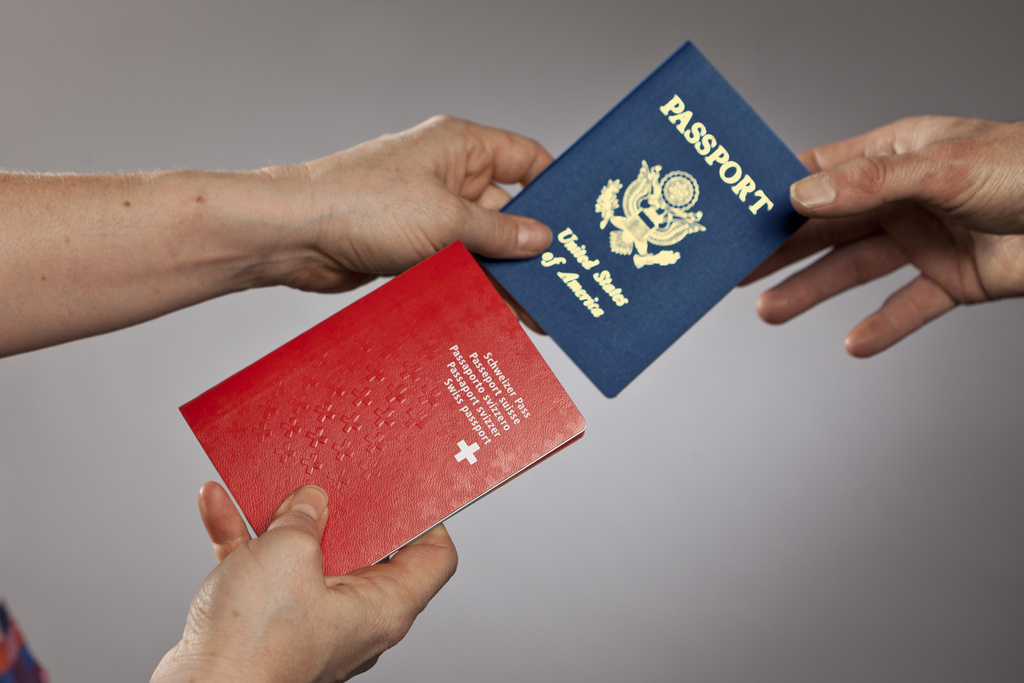Tax law pushes US expats to give up passport

Growing numbers of American expatriates are renouncing their US citizenship over a controversial new tax law and ever more burdensome fiscal and reporting obligations.
Jackie Bugnion, director of American Citizens Abroad, talks to swissinfo.ch about the backlash from United States expats and the financial sector to the Foreign Account Tax Compliance Act (Fatca), designed to fight tax evasion.
This summer the Geneva-based group launched a campaign to repeal Fatca, which they describe as “misconceived” and “dangerous for the US economy”.
US lawmakers adopted Fatca in March 2010 to crack down on US citizens hiding their assets overseas. But banks and business people who are supposed to enforce it on behalf of the US tax man are worried about its costly administrative burden and the fact that it could also clash with domestic privacy laws. Fatca has already been postponed one year and is due to be phased in from January 1, 2014.
The US is the only industrialised country that requires their overseas citizens to pay taxes.
swissinfo.ch: How can this law, which aims to crack down on tax evasion and net billions of dollars of badly needed tax revenue, work against the interests of the US, as you argue?
Jackie Bugnion: The Fatca works 100 per cent in favour of the US, putting the total legal risk and financial compliance on foreign financial institutions (FFI), turning them into arms of the Internal Revenue Service (IRS).
But it will fail as FFI will say it’s just too expensive. The consequence will be that they cut out US clients and stop investing in the US.
The US government projects that it can possibly secure additional tax revenues worth $8 billion (SFr7.5 billion) over ten years, but I have seen estimates of the cost of implementation for FFI of $200-500 billion, plus $10 billion per year for the filing requirements.
It’s the wrong time to impose this kind of thing. It will especially hit foreign banks in Europe, which are very weak right now.
swissinfo.ch: What are the chances the Fatca does not get enforced?
J.B.: Of course my hope is that it is not enforced at all, but the chances that it gets delayed are fairly high as the Treasury Department was supposed to come up with the final regulations for FFI in November but are now saying December or early January.
Many FFI are not doing anything to prepare until they get these, as it’s such a costly process. And afterwards they’ll need at least 18 months or two years to set up computer programmes for the operation. This will end up impacting not only on the sidelines of financial institutions but hitting all operations.
swissinfo.ch: What are the biggest concerns heard among US expats in Switzerland?
J.B.: At a recent town hall meeting in Geneva we asked the 130 people how many had problems maintaining or opening a Swiss bank account and 30 raised their hands. This will accelerate as the Facta date approaches, as more and more banks will simply say it’s not worth having US clients as they don’t want the reporting or legal risk concerns.
For investment accounts large Swiss banks have set up separate subsidiaries and anyone who is American has to go there, but these have very high costs.
Also, if an American overseas wants to go into a joint venture or partnership they find it very difficult. Under Fatca, the corporation has to report to the IRS any US holder if they have over ten per cent of a foreign operation.
Another big issue is green card-holders – foreigners who have worked in the US who have gone back home. After six months or one year their card is no longer valid to return to work in the US but the IRS says they still have to file taxes. Under Fatca the banks have to prove that their clients are not Americans. Their real concern is that green-card holders will simply not announce they had a green card.
swissinfo.ch: How big has the “swearing out” phenomenon become?
J.B.: It’s definitely global. Three or four years ago no one talked about renouncing nationality – now it’s an open discussion. That’s a major shift in mentality.
Many people who went through the voluntary disclosure programmes went into them in good faith as they had not been filing and thought there wouldn’t be major penalties, but got hit by 20-25 per cent of their total assets overseas in penalties. These people are saying, “with Fatca coming it’s out of question that I’m going to do this”.
In Switzerland there are delays up to mid-2013 to get an appointment [at a US consulate] to renounce citizenship.
Two neighbours, who are Americans living here, have both renounced. They say the filing requirements are just not worth it; these are average people who filed regularly.
Now the cool thing among 18-year-olds is to renounce their nationality as soon as they are 18 as they don’t want to get into this tax filing mess.
What the US is doing is pushing away a lot of people who are very honest, and work or live overseas for a multiple of reasons; they are cutting the branch on which they are sitting.
If you don’t have that international network of people who are loyal to your country and move back and forth freely you are at a major disadvantage. The diaspora is fundamental to developing international business.
The US Foreign Account Tax Compliance Act (FATCA) was enacted in 2010 as part of the Hiring Incentives to Restore Employment (HIRE) Act.
Conceived as a way to enlist the world in a crackdown on wealthy Americans evading tax, it gives global financial institutions and investment entities a choice: either collect and turn over data on US clients with accounts of at least $50,000, or withhold 30 per cent of the interest, dividend and investment payments due those clients and send the money to the IRS.
Foreign institutions and entities that refuse, or fail, to do so face bills for the taxes due, a draconian penalty of 40 per cent of the amount in question and heightened scrutiny by the IRS.
FATCA is supposed to raise $8 billion in extra tax revenues over the next ten years.
In 2009 the IRS embarked on an aggressive tax evasion hunt. This led to Swiss bank UBS admitting to aiding and abetting US tax evaders and having to pay a hefty fine. The Swiss government was subsequently forced to hand over the names of 4,450 US clients of UBS to the US authorities.
In February 2011 the IRS introduced a second offshore voluntary disclosure programmes aimed at noncompliant American taxpayers with unreported offshore bank accounts and assets. The two programmes raised an estimated $2.7 billion and 30,000 new disclosures.
The US is currently pursuing its clampdown on other Swiss banks.
The US population is about 310 million, 6.2 million of whom live abroad. Some 16,500 Americans live in Switzerland, according to the Federal Migration Office.

In compliance with the JTI standards
More: SWI swissinfo.ch certified by the Journalism Trust Initiative


















You can find an overview of ongoing debates with our journalists here . Please join us!
If you want to start a conversation about a topic raised in this article or want to report factual errors, email us at english@swissinfo.ch.